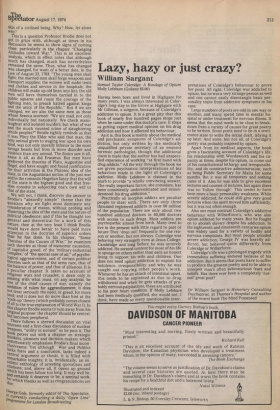Lazy, hazy or just crazy?
William Sargant
Samuel Taylor Coleridge: A Bondage of Opium Molly Lefebure (Gollanz £6.00)
Having been born and lived in Highgate for many years, I was always interested in Coleridge's long stay in the Grove at Highgate with Mr Gillman, a surgeon, because of Coleridge's addiction to opium. It is a great pity that this book of nearly five hundred pages stops just when he came under this doctor's care. It stops us getting expert medical opinion on his drug addiction and how it affected his behaviour.
As it is, this book is mainly about the medical and psychiatric symptoms of Coleridge's addiction, but only written by the medically unqualified private secretary of an eminent forensic pathologist, though the additional claim is made that the author has had unspecified experience of working "at first hand with drug addicts." All the way through the book we are given psychiatric interpretations of his behaviour made in the light of Coleridge's addiction. Molly Lefebure is claimed in the blurb to provide "a wholly convincing answer. The really important factor, she considers, has been consistently underestimated and misunderstood: his drug addiction,"
Practically all morphia addicts are peculiar people to start with. There are only three thousand registered addicts in over 60 million of the population. There are only about two hundred addicted doctors in 60,000 doctors with access to such drugs. Most addicts are psychopathic almost from birth. Many tend to live in the present with little regard to past or future They 'drop out' frequently for one reason or another, but not always. Coleridge was behaving very strangely even at Jesus College, Cambridge and long before he was severely addicted. He seemed content for most of his life to sponge on others rather than earn an honest living to support his wife and children. One does not need opium addiction to explain his indolence, irresponsibility and why he was caught out copying other people's work. Whenever he has an attack of intestinal upset, this tends to be explained as due to drug withdrawal and when he gets attacks of probably nervous palpitations, these are attributed to his poor heart condition. If Molly Lefebure had been medically qualified, she would not, I think, have made so many questionable inter pretations of Coleridge's behaviour to prove her point. All right, Coleridge was addicted to ,opium, but he was a very strange person as well and one cannot easily disentangle basic personality traits from addictive symptoms in his case.
Large numbers of poets are odd in one way or another, and many spend time in mental hospital or under treatment for nervous illness. It seems that the mind needs to be close to breakdown from a variety of causes for great poetry to be written. Some poets need to be in a semitrance state to write the initial draft, tidying it up later. And some, but not all, of Coleridge's poetry was probably inspired by opium.
Apart from its medical aspects, the book gives a fascinating account of Coleridge's life, his relationship with Wordsworth and his capacity at times, despite his opium, to come out of his constitutional lethargy and irresponsibility, and do constructive administration, such as being Public Secretary for Malta for some months. But it was all temporary and nothing came of it. Also he was able to give excellent lectures and courses of lectures, but again there was no `follow through'. This seems to have been more a basic personality weakness. While severly addicted, he could still give very good lectures when the spirit moved him sufficiently, but it was not often enough.
Also one must contrast Coleridge's addictive behaviour with Wilberforce's, who was also opium addicted for many years. But he fought on to abolish slavery despite his addiction. In the eighteenth and nineteenth centuries opium was widely used for a variety of bodily and nervous complaints. But most people avoided severe addiction, George IV was heavily addicted, but behaved quite differently from Coleridge or Wilberforce. Coleridge's life was a prolonged tragedy with tremendous suffering endured because of his addiction. But it seems that poets have to suffer to produce the greatest poetry and to be able to interpret man's often subconscious fears and beliefs. Has there ever been a completely 'normal' great poet?
Dr William Sargant is Honorary Consulting Psychiatrist, St Thomas's Hospital and author of the recent book The Mind Possessed


































 Previous page
Previous page